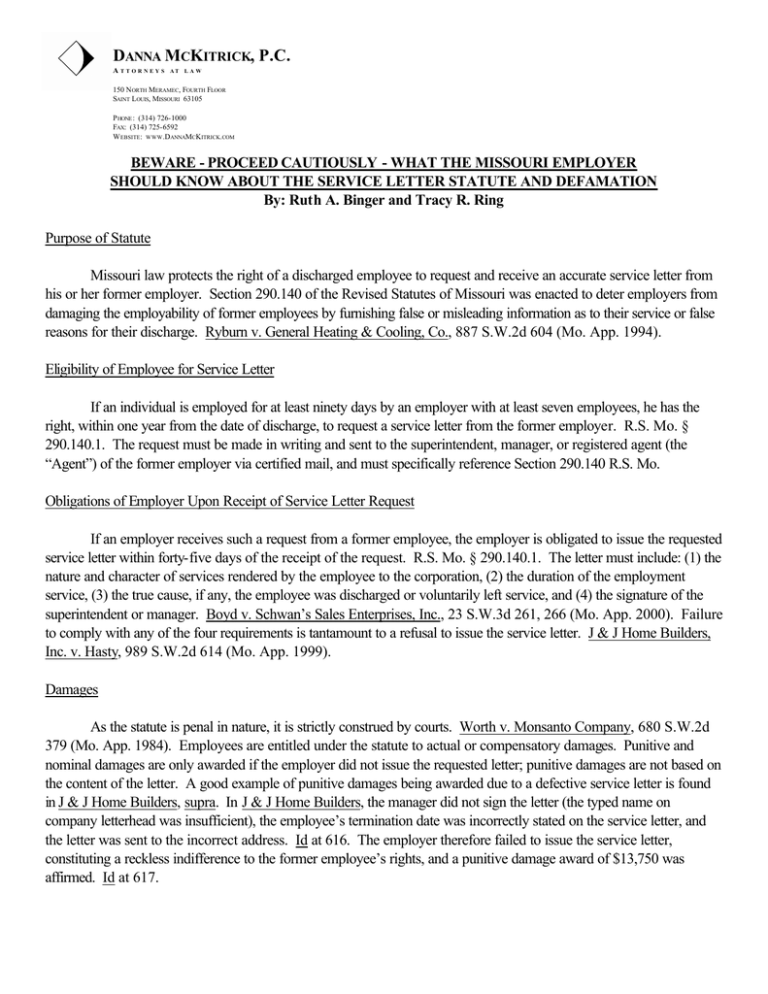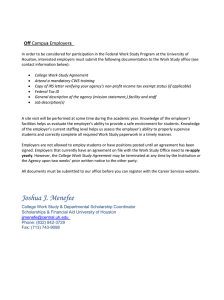
DANNA MCKITRICK, P.C.
ATTORNEYS
AT L A W
150 NORTH MERAMEC, FOURTH FLOOR
SAINT LOUIS, MISSOURI 63105
P HONE : (314) 726-1000
FAX: (314) 725-6592
W EBSITE: WWW .DANNAMCKITRICK.COM
BEWARE - PROCEED CAUTIOUSLY - WHAT THE MISSOURI EMPLOYER
SHOULD KNOW ABOUT THE SERVICE LETTER STATUTE AND DEFAMATION
By: Ruth A. Binger and Tracy R. Ring
Purpose of Statute
Missouri law protects the right of a discharged employee to request and receive an accurate service letter from
his or her former employer. Section 290.140 of the Revised Statutes of Missouri was enacted to deter employers from
damaging the employability of former employees by furnishing false or misleading information as to their service or false
reasons for their discharge. Ryburn v. General Heating & Cooling, Co., 887 S.W.2d 604 (Mo. App. 1994).
Eligibility of Employee for Service Letter
If an individual is employed for at least ninety days by an employer with at least seven employees, he has the
right, within one year from the date of discharge, to request a service letter from the former employer. R.S. Mo. §
290.140.1. The request must be made in writing and sent to the superintendent, manager, or registered agent (the
“Agent”) of the former employer via certified mail, and must specifically reference Section 290.140 R.S. Mo.
Obligations of Employer Upon Receipt of Service Letter Request
If an employer receives such a request from a former employee, the employer is obligated to issue the requested
service letter within forty-five days of the receipt of the request. R.S. Mo. § 290.140.1. The letter must include: (1) the
nature and character of services rendered by the employee to the corporation, (2) the duration of the employment
service, (3) the true cause, if any, the employee was discharged or voluntarily left service, and (4) the signature of the
superintendent or manager. Boyd v. Schwan’s Sales Enterprises, Inc., 23 S.W.3d 261, 266 (Mo. App. 2000). Failure
to comply with any of the four requirements is tantamount to a refusal to issue the service letter. J & J Home Builders,
Inc. v. Hasty, 989 S.W.2d 614 (Mo. App. 1999).
Damages
As the statute is penal in nature, it is strictly construed by courts. Worth v. Monsanto Company, 680 S.W.2d
379 (Mo. App. 1984). Employees are entitled under the statute to actual or compensatory damages. Punitive and
nominal damages are only awarded if the employer did not issue the requested letter; punitive damages are not based on
the content of the letter. A good example of punitive damages being awarded due to a defective service letter is found
in J & J Home Builders, supra. In J & J Home Builders, the manager did not sign the letter (the typed name on
company letterhead was insufficient), the employee’s termination date was incorrectly stated on the service letter, and
the letter was sent to the incorrect address. Id at 616. The employer therefore failed to issue the service letter,
constituting a reckless indifference to the former employee’s rights, and a punitive damage award of $13,750 was
affirmed. Id at 617.
Defamation Consequences
Employers also must be extremely careful when issuing the service letter because it can leave them vulnerable to
a common law defamation claim. Liability for defamation in Missouri requires the publication of a defamatory statement,
which identifies the plaintiff, and is false, published with the requisite degree of fault, and is damaging to the plaintiff’s
reputation. Overcast v. Billings Mutual Ins. Co., 11 S.W.3d 62, 70 (Mo. 2000). Practically, if the stated reason for
termination in the service letter is false and damaging to the employee’s reputation, the employer may be held liable for
defamation. Truth, of course, is a defense to a defamation action, but a very expensive defense. Employers must be
aware when issuing a service letter that defamatory statements can result in liability.
Drafting Considerations
Accordingly, employers should be sure to strictly follow the service letter statute and the four requirements
imposed thereunder, but use caution when addressing the reason for termination. When drafting, picture yourself as
dancing on the head of a pin and use caution. Wise employers will consult with their counsel before issuing a service
letter. Lawyers for the terminated employee look at the service letter statute as a vehicle to, at the minimum, prove
pretext by luring employees into taking inconsistent termination positions, or, at the maximum, creating a viable cause of
action for the terminated employee. Your receipt of a service letter request should put you on notice that your
terminated employee has consulted an attorney and you are now in an adversarial relationship. You have forty-five days
to respond, so collect the facts, analyze the issues and carefully draft the letter so it fulfills the statute and is consistent
with the position you are taking with all other interested governmental agencies including the Equal Employment
Opportunity Commission and Unemployment Compensation Division.
*****
Ruth A. Binger is Principal in the Clayton, Missouri based law firm of Danna McKitrick, P.C
Tracy R. Ring is an Associate in the Clayton, Missouri based law firm of Danna McKitrick, P.C.
Copyright©2003 Danna McKitrick, P.C.
All rights reserved.

